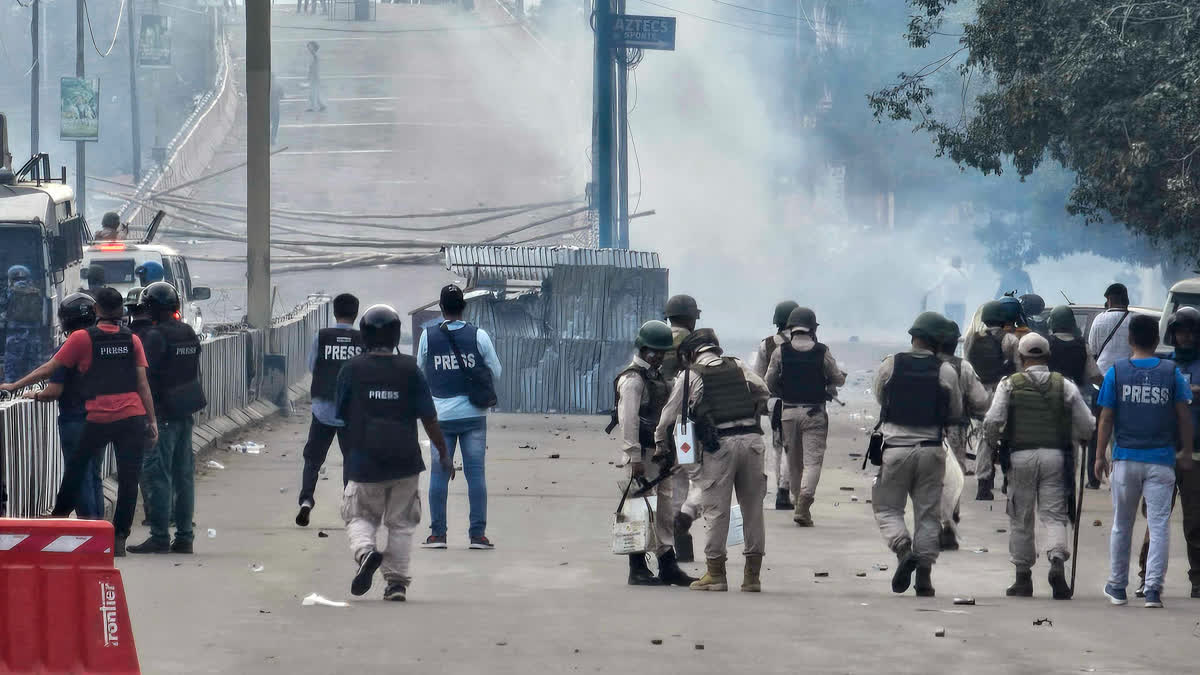The ethnic violence between the Meiteis and the Kukis in Manipur, which erupted in early May 2023, shows no signs of abating. Daily clashes have marked this ongoing conflict, and recent reports highlight the alleged use of advanced weaponry, including drones and Rocket Propelled Grenades (RPGs).
On September 1, 2024, a drone attack purportedly carried out by Kuki militants in Koutruk, Imphal West, resulted in one death and injuries to several others, including three security personnel. Following this, Manipur experienced multiple similar attacks, suggesting that the conflict has escalated with the involvement of sophisticated weaponry. This shift in the nature of the violence, viewed through the lens of national security, has overshadowed the more pressing need for effective conflict resolution. The focus has largely been on investigating the sources of these weapons rather than addressing the root causes and societal responses to the violence.
Police fire tear gas shells to disperse students protesting against a fresh wave of ethnic violence in Imphal, Manipur, on Sept. 10, 2024. (AP) ‘-State’s Response-’
The state's response to the Meitei-Kuki conflict has been largely inadequate. The approach has been predominantly security-focused, with law-and-order measures such as curfews and internet suspensions intended to quell violence. While these tactics are conventional, they address the symptoms rather than the underlying issues of the conflict. Despite Chief Minister Biren Singh's claims on June 29, 2024, that the conflict would soon be resolved, subsequent escalations in September contradict these assurances. Security concerns, including illegal migration from Myanmar allegedly supported by the Kukis, growing poppy cultivation in Kuki-dominated areas, and external actors supplying arms to militant groups, have been identified by the governments that are prioritised to be addressed. Although these concerns are valid, the state's response has been limited to identification without effective intervention. The Chief Minister’s assurance that the conflict resolution was part of the NDA-3 Government’s ‘100-day’ plan, which began on June 4, has been criticised as an 'abject failure' by figures like Mallikarjun Kharge, President of the Indian National Congress. The civil society organisations in Manipur, such as the Coordinating Committee on Manipur Integrity (COCOMI), have condemned the central government for its alleged role in the ‘extermination of indigenous peoples of Manipur.’
‘-Poor response from communities involved-’
The response from both communities involved in the conflict has also been lacking. There have been minimal efforts to initiate meaningful inter-community dialogues aimed at restoring peace. The Kuki Inpi, the apex body of the Kukis, declared in July 2024 that no peace talks were underway between the Kukis and the Meiteis. Such a statement from the Kukis was preceded by the CM’s statement that reflected that the peace talks between the Meiteis and the Kukis should not affect the territorial integrity of Manipur. Although a peace meeting occurred between the Hamars (a Kuki sub-group) and the Meiteis in Jirabam district on August 1, it yielded no substantial results. Instead, community organisations on both sides continue to pursue their demands rigidly. The Kuki organisations’ push for a separate territorial or administrative arrangement is as contentious as the Meitei groups’ questioning of the Kukis’ claim to indigeneity. The Meitei narrative of preserving Manipur's ‘territorial integrity’ has only heightened inter-community tensions. The Kuki demand for a separate territory is challenged by historical conflicts between Kuki sub-groups, which undermine the legitimacy of such a demand. Furthermore, the political decision to remove the free-movement regime along the India-Myanmar border in April 2024 has exacerbated tensions, particularly affecting the Kukis' ability to maintain cross-border ties.
Police fire tear gas shells to disperse students protesting against a fresh wave of ethnic violence in Imphal, Manipur, on Sept. 10, 2024. (AP) ‘Conflict resolution’
The urgency of resolving the Kuki-Meitei conflict cannot be overstated. The state must adopt a comprehensive approach that extends beyond security measures. The initiatives such as addressing the asymmetry in political representation between the Meiteis, Kukis, and Nagas, reducing the development gap between hill and valley regions, conducting elections for the Autonomous District Councils (ADCs), and empowering these councils to address local governance issues are crucial steps. It is important to mention that the terms of the last elected ADCs in Manipur lapsed in November 2020. There has been a four year delay in conducting the elections for the six ADCs in Manipur. Although the state government has taken a decision to conduct the ADC elections, the Kuki groups have called for boycotts. In such scenarios, it is the responsibility of the state government to create a condition for the maximum participation of people across the communities for the ADC elections. Such a step can be a step towards conflict resolution. Additionally, establishing a high-level committee to hear and address the grievances of the conflict's most affected individuals is essential. Focusing solely on security aspects and external factors such as illegal migration, drug trafficking, and arms supply will only offer limited results. Socially, both communities need to embrace dialogue and demonstrate a willingness to engage in discussions. While the path to resolving the conflict may be long and complex, prioritising dialogue could significantly reduce the scope of violence and contribute to a more peaceful resolution in Manipur.
